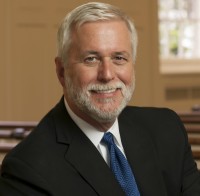Cloud and fire: Discernment and the will of God
Martha Tidwell sat before me wearing a blue pants suit and a weary face. Four years ago she left her high-paying job as an accountant after having discerned, with her church’s help, that she was called by God to begin the process of becoming a pastor. Her husband, Ted, was supportive and quit his job as well so that they could come to Pittsburgh to begin her studies.
They sold their house at a loss and moved their young family into a seminary apartment. Although they lived frugally with Ted’s new, lower-paying job, they still had to take on considerable debt. Over the next three years Martha devoted herself to theological studies while concurrently progressing through the Presbyterian Church (U.S.A.)’s lengthy process of discernment. Finally she graduated with honors and was ready to serve as a pastor. All she needed was a parish.
But after a year of applications, she hasn’t received even an interview. The economic pressure is so great that she wonders if she should get another accounting job. She was neither tearful nor angry as she told me this story. Mostly she was just confused as she wondered aloud if she and her church had misread the will of God.
There are plenty of stories that begin with a dream, depict the costs and conclude with celebrations of how God did the most miraculous thing to make the dream come true. But there are the other stories that we don’t tell so often. These are the stories like Martha’s that conclude with, “Oh, so this isn’t going to happen. Now what?”
Discernment is a cool word in religious circles. All the spiritual gurus use it. Even those of us who think of ourselves as spiritual grasshoppers strive to discern the will of God. When faced with a difficult choice we pray, meditate over biblical texts, discuss the options in community, pray more and listen for the voice of God through it all. We know all about the process of discernment. What we don’t know, and cannot know, is the will of God.
When the Hebrews were making their way through the wilderness after leaving Egypt, God led them with a cloud by day and fire by night. Neither of these is a particularly comforting image for direction. But this is still how God leads us through life.
In the daytime hours when we are busy with plans and strategies, God is present only as a nebulous cloud. It is so hard to grab hold of that. At night when we are lying in bed staring at the ceiling, alone with our anxieties, God is a pillar of fire we cannot touch.
These are not just Old Testament images. The disciples thought they had a pretty good idea who Jesus was until he was transfigured with an enveloping cloud. That’s when they fell on their faces. The Epistle to the Hebrews makes it clear that “our God is a consuming fire” (12:29). There are certainly more comforting biblical images that describe our relationship with God, but when it comes to spiritual discernment we cannot ignore the severe reminders that the Almighty is not a personal coach.
There is clear guidance in the Bible for much of our choice-making. No one has to spend a lot of time pondering if God would be OK with a choice to spend life scoffing at the call to do justice. The hard choices come when there is no clear direction from the biblical witness to God.
Are you called to serve the kingdom as a mother, a lawyer or both? Should the church use its limited resources to support the homeless shelter or the AIDS clinic? Should I drop everything and go to seminary? No one motivated by faith ap proaches these choices without prayerful discernment. We would love a little input from above. But God doesn’t tend to show up at the storyboard meetings.
We need to be careful with how we toss around the call to discern the will of God. What creature dares to rebuild the Tower of Babel in order to climb up and peer into the mind of God? Our real calling is to discern what we will do after what we thought should happen doesn’t happen.
Maybe your discernment of God’s will was right and the people with the power got it wrong, but how can you know? Does it really matter? The important question is, “Now what?”
Now there is cloud and fire. There is a God who is with us but not easily handled. There is humility, confusion, regret, hurt and fear—and a choice about what to do with our hearts. This is where the real discernment begins.
Now we make the most important choice. We echo the prayer of Jesus in the Garden of Gethsemane: “Nevertheless, not my will, but your will be done.”
This is the will of God. About this, and perhaps this only, we can be certain when it comes to spiritual discernment. God wills us to be led by a cloud and fire we cannot hold.





